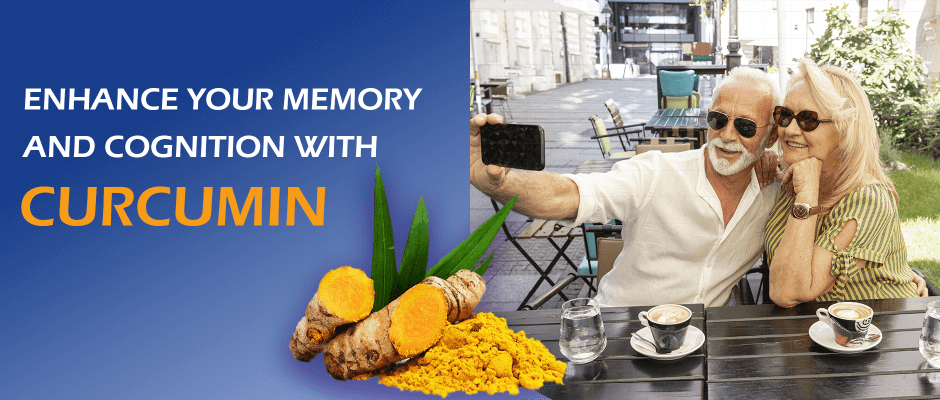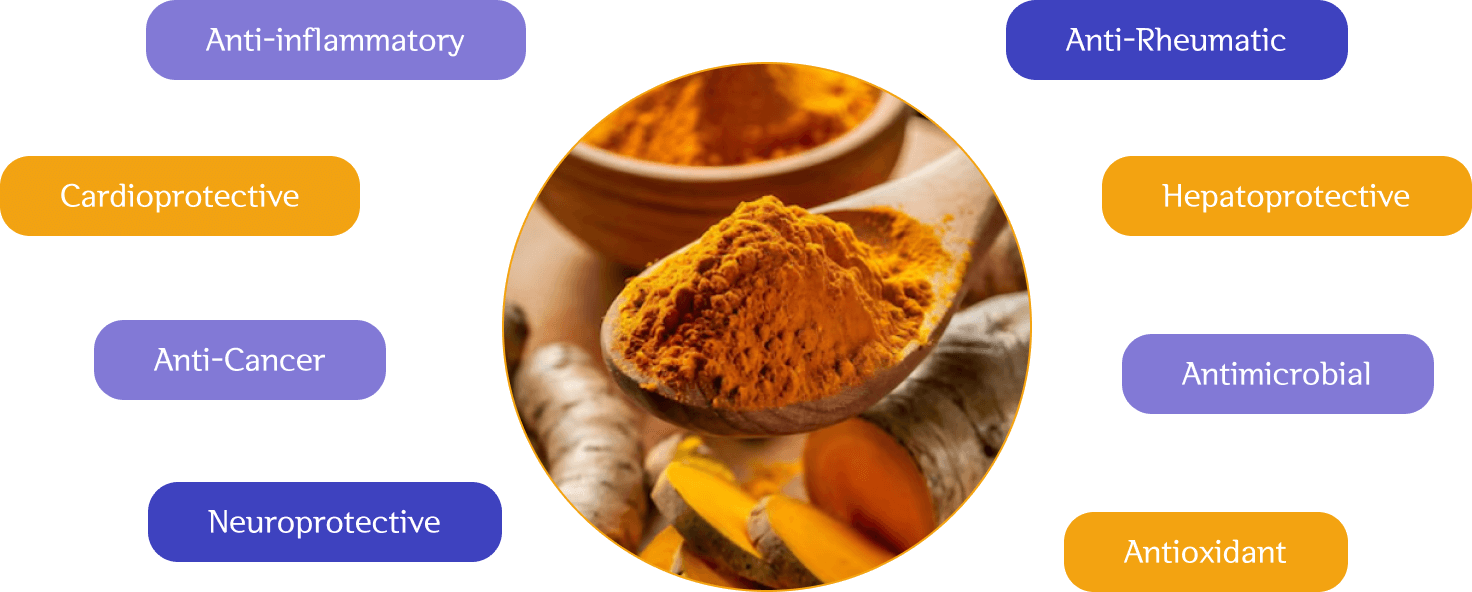 Most people expect to experience some amount of physical and mental decline as we age. But in recent decades, the incidence of dementia has risen dramatically, with nearly 7 million older US adults living with Alzheimer’s disease, according to the Alzheimer’s Association. Many older adults fear the loss of memory and cognitive decline more than they worry about losing mobility. Today, advanced research in the growing field of geriatrics is debunking the inevitability of age-related changes in memory and cognition. One important nutrient that has gotten the attention of geriatric researchers is curcumin, a fairly common spice with the potential to halt and reverse cognitive decline in older adults.
Most people expect to experience some amount of physical and mental decline as we age. But in recent decades, the incidence of dementia has risen dramatically, with nearly 7 million older US adults living with Alzheimer’s disease, according to the Alzheimer’s Association. Many older adults fear the loss of memory and cognitive decline more than they worry about losing mobility. Today, advanced research in the growing field of geriatrics is debunking the inevitability of age-related changes in memory and cognition. One important nutrient that has gotten the attention of geriatric researchers is curcumin, a fairly common spice with the potential to halt and reverse cognitive decline in older adults.
Learn about the benefits of turmeric/curcumin for memory and cognition.
About Memory Loss and Cognitive Decline
The most common age-related changes in cognition occur in the domains of working memory, processing speed, and executive function, aka problem-solving, all of which are characteristics of Alzheimer’s disease. Ongoing research confirms that the underlying drivers of cognitive decline – β-amyloid (in senile plaques) and tau (in neurofibrillary tangles) – begin to gradually accumulate decades before dementia symptoms become apparent.
According to the Centers for Disease Control and Prevention (CDC), multiple lifestyle factors can increase your risk of developing dementia:
- Insufficient physical activity
- Cigarette smoking
- Excessive alcohol consumption
- Obesity
- Hypertension
- Diabetes
- Depression
- Hearing loss
Dementia onset has been strongly linked to excess sugar consumption. In fact, Alzheimer’s disease is often referred to as “type 3 diabetes.” One recent study of dementia patients found that simple sugars such as fructose used in sweetened beverages, snacks and packaged desserts, and sucrose used in juices, desserts, candies, and cereals, are both linked to increased dementia risk.
Changing harmful lifestyle behaviors early in life can reduce your risk of developing dementia as an older adult. Adding curcumin to your diet or taking a tumeric supplement can help to ward off metabolic disorders that contribute to memory impairment and cognitive decline.
Curcumin Effects on Health, Memory and Cognition
Curcumin is a biologically active compound derived from turmeric, the dried rhizome of the curcuma longa plant. Often labeled cumin, curcumin is a spice used in Mexican and Middle Eastern dishes, and it is the active ingredient in curry powders.
Turmeric has been used medicinally for thousands of years to treat skin disorders, respiratory problems, joint pain and digestive disorders. Today cucumin is a popular nutrient supplement for treating arthritis and other proinflammatory conditions.
Animal studies have shown curcumin to be protective against cognitive decline in monkeys and rats, preventing brain atrophy and cell loss in the prefrontal cortex, reducing neuroinflammation, and enhancing working memory. One meta-analysis of human studies found that curcumin improves working memory performance and is also beneficial for brain processing speed.
Curcumin’s bioactive characteristics include:
- Anti-inflammatory
- Cardioprotective
- Neuroprotective
- Anti-Cancer
- Anti-Rheumatic
- Hepatoprotective
- Antimicrobial
- Antioxidant

In addition to cognitive improvements, curcumin has multiple other health benefits:
- Reduces risk of cardiovascular disease risk by improving glycemic and lipid profiles
- Fights pro-inflammatory diseases like ulcerative colitis
- Improves performance of physically active people by reducing exercise-induced muscle damage and post-exercise inflammation
- Reduces the severity of side effects from chemotherapy in cancer patients

Increasing Turmeric via Diet and Supplements
Curcumin is a natural plant compound that can be safely ingested in doses up to 6 grams per day without toxicity. Turmeric is a fairly common ingredient in a host of ethnic foods, and populations like those of India who consume large amounts of curry have a lower risk of cognitive decline.
Western diets do not typically include sufficient amounts of curcumin to have an efficacious effect. Whether purchasing curcumin as a spice or as a supplement, consumers should be mindful of the source and quality of the product, along with its potency.
One analysis of curcumin supplements found a vast variance in quality from one product to the next, and concluded that it is difficult for consumers to accurately assess the quality of turmeric supplements. Moreover, when taking curcumin as an oral supplement, the rate and degree of absorption can vary greatly from one supplement and one person to the next.

To ensure you get the highest quality product with the best absorption, it is recommended to supplement with curcumin via IV infusion. When infused directly into the bloodstream, curcumin bypasses the digestive tract and travels quickly to cells throughout your body where it can immediately begin to work its magic.
Get High-Potency Curcumin IV Therapy in NYC
Around the world we are seeing alarming declines in memory and cognitive health among aging populations, and we now know that the damage begins decades before dementia symptoms set in. Supplementing with curcumin can help to protect your cognitive health and memory, both today and in the future.
Invita Wellness offers high-potency curcumin supplementation via IV infusion therapy. Our high-quality products ensure that you get the best and most bioactively available form of curcumin for optimal results. To schedule your curcumin IV therapy session, contact Invita Wellness today, and give your future self the gifts of mental acuity and a razor-sharp memory.
To schedule your curcumin IV therapy session
contact InVita Wellness today
Book Now
456 Broadway 2 Floor, New York, NY 10013, USA
Resources
Agarwal, Puja, et al. “Dietary Sugar Intake Associated with a Higher Risk of Dementia in Community-Dwelling Older Adults.” Journal of Alzheimer’s disease: JAD 95.4 (2023): 1417-1425.
https://pubmed.ncbi.nlm.nih.gov/37694364/
Sanei, Mozhdeh, and Amir Saberi-Demneh. “Effect of curcumin on memory impairment: A systematic review.” Phytomedicine 52 (2019): 98-106.
https://www.sciencedirect.com/science/article/abs/pii/S0944711318302022
Sharifi-Rad, Javad, et al. “Turmeric and its major compound curcumin on health: bioactive effects and safety profiles for food, pharmaceutical, biotechnological and medicinal applications.” Frontiers in pharmacology 11 (2020): 550909.
https://www.ncbi.nlm.nih.gov/pmc/articles/PMC7522354/
Skiba, Meghan B., et al. “Curcuminoid content and safety‐related markers of quality of turmeric dietary supplements sold in an urban retail marketplace in the United States.” Molecular nutrition & food research 62.14 (2018): 1800143.
https://www.ncbi.nlm.nih.gov/pmc/articles/PMC6277232/
Small, Gary W., et al. “Memory and brain amyloid and tau effects of a bioavailable form of curcumin in non-demented adults: a double-blind, placebo-controlled 18-month trial.” The American Journal of Geriatric Psychiatry 26.3 (2018): 266-277. https://www.ncbi.nlm.nih.gov/pmc/articles/PMC6277232/
https://www.sciencedirect.com/science/article/pii/S1064748117305110
Tsai, I-Chen, et al. “The effect of curcumin differs on individual cognitive domains across different patient populations: a systematic review and meta-analysis.” Pharmaceuticals 14.12 (2021): 1235.
https://www.ncbi.nlm.nih.gov/pmc/articles/PMC8708668/